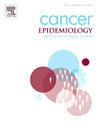Prevalence of advanced-stage breast cancer at diagnosis in Arab countries: A systematic review and meta-analysis
IF 2.3
3区 医学
Q3 ONCOLOGY
引用次数: 0
Abstract
Breast cancer is the most commonly diagnosed malignancy among women in Arab countries, where a substantial proportion present with advanced-stage disease. This systematic review and meta-analysis aimed to quantify the prevalence of stage III–IV breast cancer at diagnosis across the region. We systematically searched PubMed, Scopus, Web of Science, and the WHO Virtual Health Library on March 22, 2025, for studies reporting stage at diagnosis among women with breast cancer in Arab countries. Two reviewers independently screened and extracted data, and risk of bias was assessed using the Joanna Briggs Institute checklist. Random-effects meta-analyses were performed to estimate the pooled prevalence of advanced-stage presentation overall and by country. From 678 screened records, 26 studies from 13 countries comprising 14,176 women were included. The pooled prevalence of stage III–IV breast cancer at diagnosis was 46·0 % (95 % CI 43·0–50·0; I²=93·6 %), with marked heterogeneity across settings (range 13·0 % in Bahrain to 67·0 % in Libya and Yemen). Country-level subgroup differences were statistically significant (χ²=3271·72, df=12; p < 0·001), suggesting that national context may substantially influence diagnostic stage. Egger’s test showed evidence of small-study effects (intercept=1·23; p = 0·048). These findings highlight the enduring challenge of late breast cancer diagnosis in the Arab region. Urgent investment in early detection strategies through population-based screening, public awareness, and timely access to diagnostic services is critical to reducing mortality and improving outcomes.
阿拉伯国家晚期乳腺癌的患病率:一项系统回顾和荟萃分析
乳腺癌是阿拉伯国家妇女中最常见的恶性肿瘤,其中相当大比例的妇女患有晚期疾病。本系统综述和荟萃分析旨在量化该地区诊断时III-IV期乳腺癌的患病率。我们于2025年3月22日系统地检索了PubMed、Scopus、Web of Science和WHO虚拟健康图书馆,以获取报告阿拉伯国家女性乳腺癌诊断阶段的研究。两位审稿人独立筛选和提取数据,并使用乔安娜布里格斯研究所的检查表评估偏倚风险。进行随机效应荟萃分析,以估计总体和各国晚期表现的总患病率。从678份被筛选的记录中,纳入了来自13个国家的26项研究,涉及14176名女性。诊断时III-IV期乳腺癌的总患病率为46.0 %(95% % CI 43.0 - 50.0; I²= 93.6 %),不同情况下存在明显的异质性(巴林为13.0 %,利比亚和也门为67.0 %)。国家层面的亚组差异具有统计学意义(χ²=3271·72,df=12; p <; 0.001),表明国家背景可能对诊断阶段产生重大影响。Egger检验显示了小研究效应的证据(截距= 1.23;p = 0.048)。这些发现突出了阿拉伯地区晚期乳腺癌诊断的持久挑战。通过基于人群的筛查、提高公众意识和及时获得诊断服务,对早期发现战略进行紧急投资,对于降低死亡率和改善结果至关重要。
本文章由计算机程序翻译,如有差异,请以英文原文为准。
求助全文
约1分钟内获得全文
求助全文
来源期刊

Cancer Epidemiology
医学-肿瘤学
CiteScore
4.50
自引率
3.80%
发文量
200
审稿时长
39 days
期刊介绍:
Cancer Epidemiology is dedicated to increasing understanding about cancer causes, prevention and control. The scope of the journal embraces all aspects of cancer epidemiology including:
• Descriptive epidemiology
• Studies of risk factors for disease initiation, development and prognosis
• Screening and early detection
• Prevention and control
• Methodological issues
The journal publishes original research articles (full length and short reports), systematic reviews and meta-analyses, editorials, commentaries and letters to the editor commenting on previously published research.
 求助内容:
求助内容: 应助结果提醒方式:
应助结果提醒方式:


